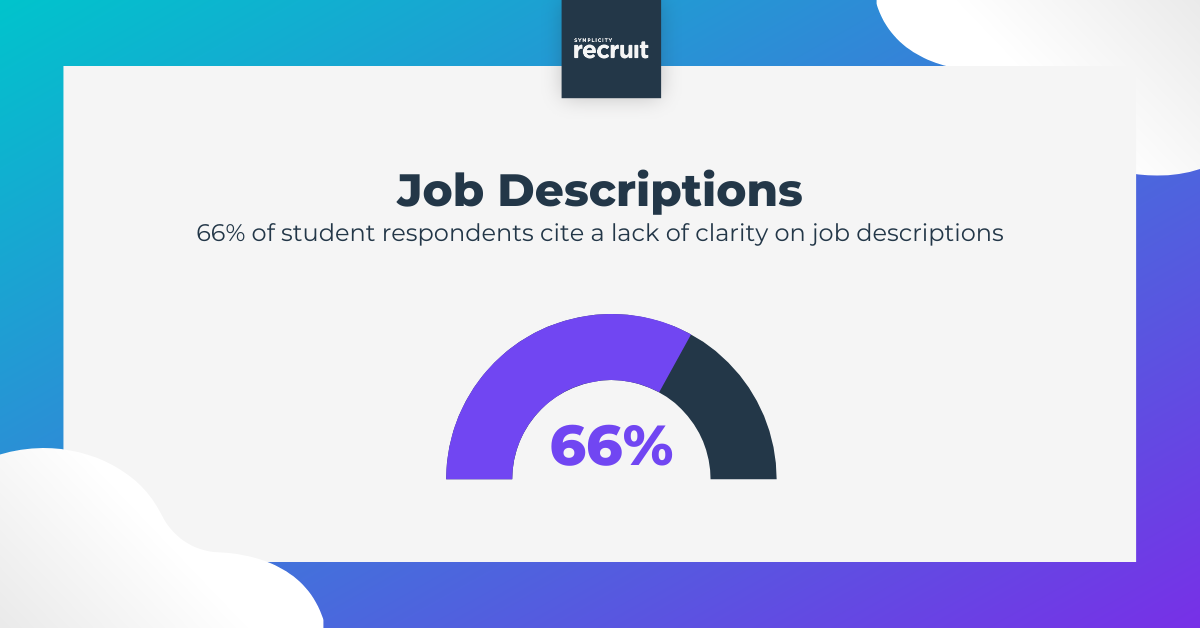Job descriptions are one of the most fundamental elements of the job search process for entry-level candidates. Yet, for students that participated in our 2023 student survey, job descriptions are one of the most significant pain points in their job search experience. In our survey, 3,500 college students, said that they found job descriptions completely unattainable, or the information needs to be more specific on the job postings for them to want to invest time in the application process.
What Are Students' Perception on the Job Description During Their Job Search Process

Entry-Level Opportunities Are Lacking Clarity
Our survey found that 66 percent of student respondents cite a lack of clarity about the entry-level role and details about the position's responsibilities as a deterrent from applying to desired entry-level jobs.
Solution: Be more clear in your description of the entry-level job you're promoting and be clear on what's expected of new employees
Too often employers rely on the use of buzzwords to hype up entry-level jobs to interested college graduates or college students, instead of providing key information, like salary, on-the-job training descriptions, and day-to-day activities to describe the job. Gen Z appreciates a more upfront approach that gives them a more realistic idea of what their potential role in the team will entail.
One of our survey respondents encourages their potential employer to "actually describe the work environment instead of using cliches such as 'dynamic and fast-paced environment.'" Try to give an example of the type of work entry-level employees would be expected to accomplish in the business. Recent graduates are much more likely to be turned off by a vague job description than one that is too long, but that explains the essence of the entry-level job.
Entry-Level Job Postings Are Setting the Bar Too High

According to 65 percent of students, oftentimes when they read a job description for an entry-level job they're interested in, it reads more like a wishlist that's focused on finding a perfect candidate with more professional experience than what a college student or graduate can realistically offer.
Solution: Be realistic about the required work experience for entry-level positions
One of the students participating in our survey responded that: "The [required] experience for many entry-level jobs and internships is unrealistic. How do you gain experience for an entry-level job if they expect 2-3 years of professional experience?"
It's important to remember that recent graduates are not always able to back up two to three years' worth of experience in a desired industry. Employers can instead focus on what the candidates can realistically offer. Looking at any experiential learning, internships, problem-solving skills, or other interpersonal skills plays a part in showcasing a candidate's achievements and can better predict a new hire's long-term success in the company.
Entry-Level Job Postings Are Missing Salary Ranges
It's no secret that Gen Z values communication and pay transparency. This is why including salary ranges in the descriptions of entry-level jobs is growing as an expectation with 53 percent of students saying they would be discouraged from applying to a job posting if it was not included.
Solution: Be transparent about salary ranges in entry-level jobs
Gen Z is not shy when they're talking about salaries, expecting the same kind of openness from a potential employer they want to work for. Including salary range and benefits, along with minimum requirements, is a good way to attract a more diverse candidate pool for positions within the company. When asked which DEI efforts matter the most to students, pay transparency ranked as the most important to all students, but especially among underrepresented talent.
About Symplicity Recruit
Symplicity Recruit is the premier early talent recruiting platform used by over 600,000 employers. Key features include centralized management of job postings across a network of over 600 academic institutions, a filterable resume database, and the ability to directly message students.
To learn more about the 2023 state of early talent recruiting and the job search process, click below to download the full report.



